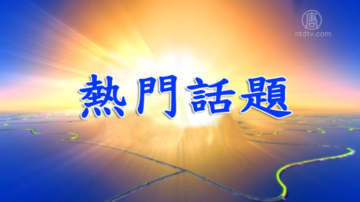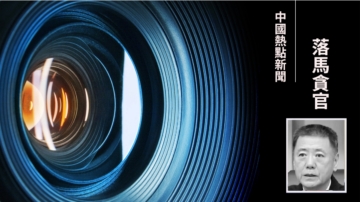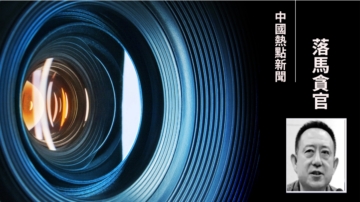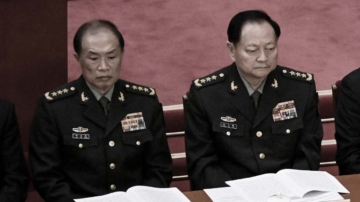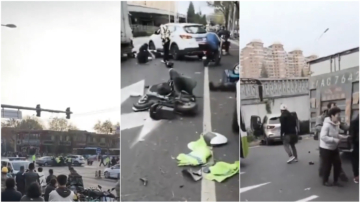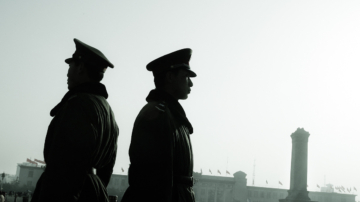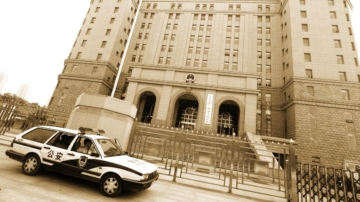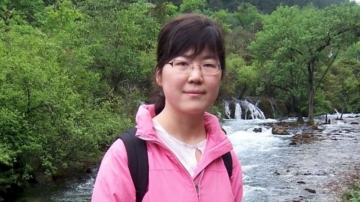【新唐人2013年09月27日訊】中共總書記習近平近日用了四個半天的時間,出席了河北省委的所謂「民主生活會」,並要求省委書記周本順等人面對媒體鏡頭開展「相互批評」與「自我批評」,官員們互相揭發和「自抽嘴巴」的窘態被網絡廣傳,在民間引為笑談。
大陸媒體報導說,9月23號至25號,在河北省委整風專題「民主生活會」上,習近平呼籲當地官員大膽使用批評和自我批評解決中共黨內矛盾。
23號上午,習近平一到河北,就聽取了中共督導組關於河北省委的匯報,並分別和省委書記周本順、省長張慶偉談話,希望他們帶頭開展批評和自我批評。
25號,中共喉舌《央視臺》的畫面中,周本順、張慶偉、紀委書記臧勝業、秦皇島市委書記田向利等人,面對鏡頭進行了自我檢討和互相揭發。
周本順:「我是覺得田向利同志有急於求成,急於證明自己,急於讓領導認可這樣一種表現。」
臧勝業:「我給慶偉同志提的意見主要是對聽匯報不是太耐心,不太耐煩,這樣對幹部不夠尊重,對不同的意見不能完全採納。」
旅美原大陸史學家劉因全指出,中共官員的問題是中共獨裁專製造成的,所謂的整黨整風只是作表面文章,解決不了實質問題。
旅美原大陸史學家劉因全:「我們看到這些幹部,即使在這樣的所謂政面前還是在敷衍,他們還是大事化小,小事化了,敷衍塞責,小罵大幫忙,沒有揭露甚麼很實際性的問題。」
美國中文雜誌《中國事務》總編輯伍凡表示,共產黨篡權幾十年來沒人監督它,《央視》播出河北官員自我檢討的畫面,實際是作秀。
美國中文雜誌《中國事務》總編輯伍凡:「共產黨為甚麼爛?並不是作風爛,作風是一個表象,根本的爛是從道德、思想觀念,欺侮老百姓,吃的喝的用的都用老百姓,制度不是民選的。」
海外《大紀元》報導說,周本順出任政法委等職務近10年,是前中央政法委書記周永康的鐵桿。習近平上臺後,政法委江派人馬遭清洗,周本順被空降河北主政,外界認為習近平這次舉動有深意。
北京時政觀察人士華頗:「習近平上臺要進行整黨整風,說白了還是要樹立自己的權威,就是讓他們這些人首先聽話,讓他們自己站出來自己批判自己,自己批判自己對於一般人來說是很難堪的事情,但是習近平就是通過這樣方法在他們面前樹立權威。」
華頗認為,習近平把河北當作自己立威的一個點兒,讓河北帶頭給各地官員做出榜樣。
伍凡:「共產黨如果這個制度不改變,還是輕描淡寫的自我批評一下,共產黨照樣是屠殺老百姓,屠殺法輪功修煉者,把大V關起來,把所有的網路控制起來,甚至把大老虎打掉一個再換一個,上面後來的還是成老虎。」
習近平上台後已經三下河北。去年12月30號,他到訪河北阜平縣一個貧困小山村;7月11號至12號,再次到河北調研時承認,中共面臨的挑戰和問題依然嚴峻複雜,「趕考」遠未結束。」
採訪編輯/李韻 後製/君卓
How Does Xi Jinping Establish His Authority?
Xi Jinping, leader of the Chinese Communist Party (CCP),
spent five days in Hebei to attend a democratic life conference
initiated by the Hebei Provincial Committee.
He asked local party secretary Zhou Benshun and other
officials to mutually criticize each other in front of the media.
Officials' mutual criticism and self-criticism have been widely
circulated on the Internet and their embarrassment has been the butt of jokes among netizens.
Mainland media outlets said that during the conference
on September 23-25, Xi Jinping asked local officials
to resolve conflicts within the CCP by bold mutual criticism
and self-criticism.
On the morning of September 23, Xi heard reports
from Hebei Provincial Committee and met with Party
Secretary Zhou Benshun and Governor Zhang Qingwei
repectively.
Xi wanted both of them to take the lead in carrying out
mutual criticism and self-criticism.
On September 25, the state-owned CCTV showed
Zhou and other officials criticizing each other.
Zhou Benshun:"I believe that comrade Tian Xiangli was
anxious to succeed, eager to prove himself and gain recognition from his superiors."
Zang Shengye:"My suggestion to comrade Zhang Qingwei
is to listen to reports patiently, show respects to others and fully adopt others' viewpoints."
Liu Yinquan, US-based Chinese historian, points out that
problematic officials stem from the CCP's dictatorship,
and the so-called party rectification is just scratching
the surface and putting on a show.
Liu:"We see these cadres putting on a show
before the public, just acting perfunctorily.
Soon, major issues turn into minor ones and minor issues
turn into nothing.
What they do cannot disclose anything substantial."
Wu Fan, chief editor of China Affiars:"The CCP is rotten,
and its style is only at the surface.
It's rotten from the standpoints of morals and concepts.
They bully ordinary citizens and squander tax money.
It is not a regime chosen by the people."
Overseas media, the Epoch Times, reported that
Zhou Benshun was Zhou Yongkang's hardcore supporter.
After Xi took office, Zhou Benshun was demoted to Hebei.
Outsiders believe Xi Jinping's move is quite meaningful.
Hua Po, Beijing political observer:"After Xi took office,
he wanted to establish his authority.
That is, let these officials obey and stand up to criticize
themselves.
Self-criticism is quite embarrassing for most people.
However, Xi uses it to establish his authority."
Hua Po:"Xi makes Hebei his base to establish authority,
and asks local officials to set an example for officials in other areas."
Wu Fan:"If the CCP insists on keeping its system,
killing ordinary citizens, killing Falun Gong practitioners,
jailing Internet VIPs, or controlling the Internet,
or even attacking a 'big tiger' and replacing him with another tiger,
using light self-criticism like this will not accomplish its goal."
After Xi took office, he has been to Hebei three times.
He visited a poor village in Hebei on December 30, 2012.
On July, 2013, he went to Hebei and admitted that the CCP
faces severe challenges and complicated issues.
大陸媒體報導說,9月23號至25號,在河北省委整風專題「民主生活會」上,習近平呼籲當地官員大膽使用批評和自我批評解決中共黨內矛盾。
23號上午,習近平一到河北,就聽取了中共督導組關於河北省委的匯報,並分別和省委書記周本順、省長張慶偉談話,希望他們帶頭開展批評和自我批評。
25號,中共喉舌《央視臺》的畫面中,周本順、張慶偉、紀委書記臧勝業、秦皇島市委書記田向利等人,面對鏡頭進行了自我檢討和互相揭發。
周本順:「我是覺得田向利同志有急於求成,急於證明自己,急於讓領導認可這樣一種表現。」
臧勝業:「我給慶偉同志提的意見主要是對聽匯報不是太耐心,不太耐煩,這樣對幹部不夠尊重,對不同的意見不能完全採納。」
旅美原大陸史學家劉因全指出,中共官員的問題是中共獨裁專製造成的,所謂的整黨整風只是作表面文章,解決不了實質問題。
旅美原大陸史學家劉因全:「我們看到這些幹部,即使在這樣的所謂政面前還是在敷衍,他們還是大事化小,小事化了,敷衍塞責,小罵大幫忙,沒有揭露甚麼很實際性的問題。」
美國中文雜誌《中國事務》總編輯伍凡表示,共產黨篡權幾十年來沒人監督它,《央視》播出河北官員自我檢討的畫面,實際是作秀。
美國中文雜誌《中國事務》總編輯伍凡:「共產黨為甚麼爛?並不是作風爛,作風是一個表象,根本的爛是從道德、思想觀念,欺侮老百姓,吃的喝的用的都用老百姓,制度不是民選的。」
海外《大紀元》報導說,周本順出任政法委等職務近10年,是前中央政法委書記周永康的鐵桿。習近平上臺後,政法委江派人馬遭清洗,周本順被空降河北主政,外界認為習近平這次舉動有深意。
北京時政觀察人士華頗:「習近平上臺要進行整黨整風,說白了還是要樹立自己的權威,就是讓他們這些人首先聽話,讓他們自己站出來自己批判自己,自己批判自己對於一般人來說是很難堪的事情,但是習近平就是通過這樣方法在他們面前樹立權威。」
華頗認為,習近平把河北當作自己立威的一個點兒,讓河北帶頭給各地官員做出榜樣。
伍凡:「共產黨如果這個制度不改變,還是輕描淡寫的自我批評一下,共產黨照樣是屠殺老百姓,屠殺法輪功修煉者,把大V關起來,把所有的網路控制起來,甚至把大老虎打掉一個再換一個,上面後來的還是成老虎。」
習近平上台後已經三下河北。去年12月30號,他到訪河北阜平縣一個貧困小山村;7月11號至12號,再次到河北調研時承認,中共面臨的挑戰和問題依然嚴峻複雜,「趕考」遠未結束。」
採訪編輯/李韻 後製/君卓
How Does Xi Jinping Establish His Authority?
Xi Jinping, leader of the Chinese Communist Party (CCP),
spent five days in Hebei to attend a democratic life conference
initiated by the Hebei Provincial Committee.
He asked local party secretary Zhou Benshun and other
officials to mutually criticize each other in front of the media.
Officials' mutual criticism and self-criticism have been widely
circulated on the Internet and their embarrassment has been the butt of jokes among netizens.
Mainland media outlets said that during the conference
on September 23-25, Xi Jinping asked local officials
to resolve conflicts within the CCP by bold mutual criticism
and self-criticism.
On the morning of September 23, Xi heard reports
from Hebei Provincial Committee and met with Party
Secretary Zhou Benshun and Governor Zhang Qingwei
repectively.
Xi wanted both of them to take the lead in carrying out
mutual criticism and self-criticism.
On September 25, the state-owned CCTV showed
Zhou and other officials criticizing each other.
Zhou Benshun:"I believe that comrade Tian Xiangli was
anxious to succeed, eager to prove himself and gain recognition from his superiors."
Zang Shengye:"My suggestion to comrade Zhang Qingwei
is to listen to reports patiently, show respects to others and fully adopt others' viewpoints."
Liu Yinquan, US-based Chinese historian, points out that
problematic officials stem from the CCP's dictatorship,
and the so-called party rectification is just scratching
the surface and putting on a show.
Liu:"We see these cadres putting on a show
before the public, just acting perfunctorily.
Soon, major issues turn into minor ones and minor issues
turn into nothing.
What they do cannot disclose anything substantial."
Wu Fan, chief editor of China Affiars:"The CCP is rotten,
and its style is only at the surface.
It's rotten from the standpoints of morals and concepts.
They bully ordinary citizens and squander tax money.
It is not a regime chosen by the people."
Overseas media, the Epoch Times, reported that
Zhou Benshun was Zhou Yongkang's hardcore supporter.
After Xi took office, Zhou Benshun was demoted to Hebei.
Outsiders believe Xi Jinping's move is quite meaningful.
Hua Po, Beijing political observer:"After Xi took office,
he wanted to establish his authority.
That is, let these officials obey and stand up to criticize
themselves.
Self-criticism is quite embarrassing for most people.
However, Xi uses it to establish his authority."
Hua Po:"Xi makes Hebei his base to establish authority,
and asks local officials to set an example for officials in other areas."
Wu Fan:"If the CCP insists on keeping its system,
killing ordinary citizens, killing Falun Gong practitioners,
jailing Internet VIPs, or controlling the Internet,
or even attacking a 'big tiger' and replacing him with another tiger,
using light self-criticism like this will not accomplish its goal."
After Xi took office, he has been to Hebei three times.
He visited a poor village in Hebei on December 30, 2012.
On July, 2013, he went to Hebei and admitted that the CCP
faces severe challenges and complicated issues.

